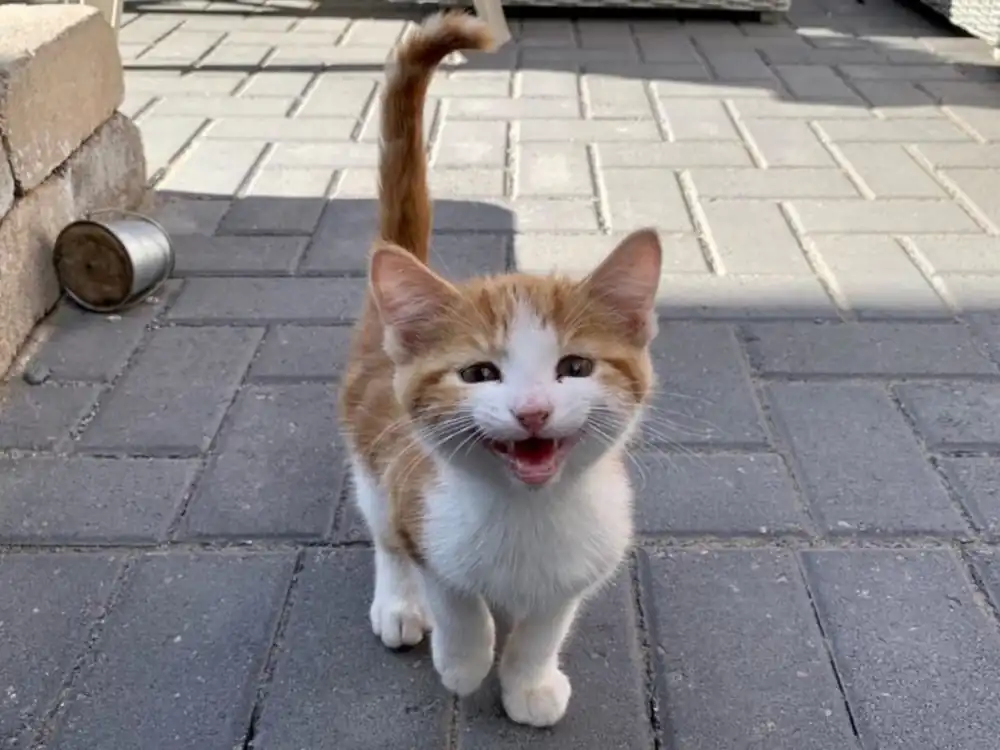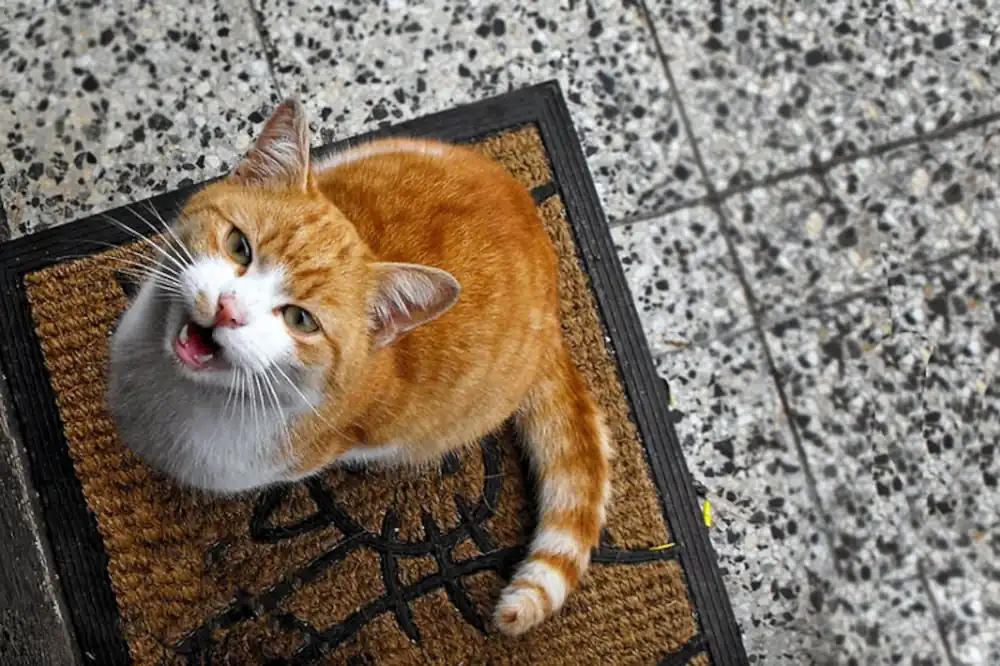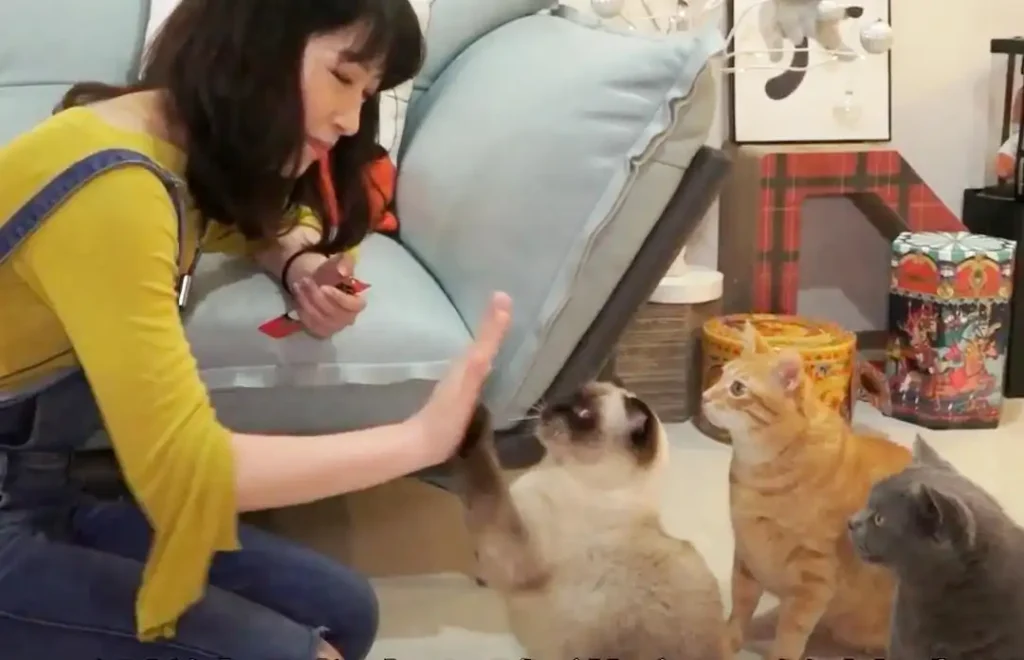Cats at home will communicate with their owners through different purrs such as “Meow Meow Meow”, “Au Ou”, etc. What do cats want to express through different cat purrs? In this article, we have compiled a list of 9 common cat purrs to help you understand the different meanings and needs that each purr represents!
What are the 9 common purrs of cats?

Cats communicate with each other through body language and scent, but it was only after living with humans that they gradually evolved to use their meows to communicate. In other words, cats usually only meow when they are facing humans, and this is a language that is exclusively used by cats to communicate with humans.
Cat meows on different occasions and in different situations represent different meanings. Below is a list of some common cat meows to help your slave understand your master and successfully figure out his or her intentions.
1. Short “meow
2. The long, drawn-out “meow” .
3. Huffing and hissing sounds
4. Gurgling sounds
5. “Au ou” sound like a baby’s cry
6. Crunching sound
7. A flat meow-ooh sound
8. “Meow-ow-ow” sound
9. A low whining “ooh-ooh” sound
These are the 9 types of purrs that represent what your cat is asking for

Purr 1 – The Short Meow
Cats often greet each other with a snort, but this is not the case with humans. When you come home, you will usually see your cat waiting by the door, and as soon as you enter, it will let out a short meow. This is your cat saying “hello,” “hi,” “hello,” “hello,” “got it,” and “got it.” The short meow is your cat saying hello or responding to the owner’s purr.
Purr 2 – Long-pitched Meow Au Ou
This kind of purring is usually a sign of “need”, either because you are hungry and want to eat, or because you just want to be petted, depending on the situation of your cat.
For example, if a cat is standing next to a bowl when it makes a “meow, au ou” sound, it is more likely that it is trying to tell its owner that “I am hungry”; and if it makes this kind of purring sound for no reason other than hunger, it is very likely that it is begging for attention, and it wants to be accompanied by its owner to play with it!
Purr 3 – Huffing and Hissing
This may be the preview of a cat that is angry or scared and ready to attack. When you hear a hissing sound or a huffing sound, it is advisable to keep a distance from the cat to avoid being scratched or bitten, and wait for the cat to calm down. Cats also use purring to warn each other, asking them to “stay away from me” and “don’t come near me again”.
Purr 4 – Purring and Groaning
It is often thought that cats purr because they are happy and relaxed, but in fact, there are occasions when the purring sounds are different, and the meaning of the purring sounds varies depending on the age of the cat and the situation.
Kittens’ purring
When a kitten is born, it can only find its mother through the vibrating sound of its purring. Therefore, a mom will use her purr to guide her kitten to the right place to drink milk, and the kitten will respond to the mom with a purr that says “I’m full”, a unique form of communication between cats.
The purring sound of petting, happiness and relaxation
A cat that trusts its owner and feels at ease around him or her will also purr. This is usually a sign of petting, happiness or relaxation, so if you can hear your cat purring in a relaxed and secure manner, it means that your cat trusts you very much!
Soothing purr
If your cat is in pain or under stress, it will also purr. For example, if a mother cat is in pain during labor, or if she is frightened and stressed during a hospital visit, she will purr to soothe herself. Cats will also purr to calm themselves when they encounter people, events or objects that frighten them.
Tips on purring
Did you know that your cat’s purring can be beneficial to human health? This is because the frequency of the purring sound is similar to that of medical sound therapy, which can help relieve stress and lower blood pressure when stress is relaxed.
Purr 5 – “Awww” like a baby’s cry
If you hear a baby-like cry in the middle of the night, and it sounds a little bit scary, there is a high chance that your cat is in heat.
When a cat is in heat, it will become particularly agitated and its personality may change, making it easy to hurt humans and affecting its appetite. The heat period is a torture for cats, so it is advisable to take your cat to be neutered as soon as possible.
Tips for Neutering Cats
It is generally recommended that female cats be sterilized before their first heat, i.e. before they are almost 5 months old, to help reduce the incidence of breast and ovarian cancer. Male cats should not be sterilized too early and it is recommended to do it after one year of age.
Purr 6 – Crunching Sound
It is recommended that slaves spend some time every day playing with their cats using cat teasers or toys, not only to satisfy their hunting nature, but also to interact with their masters to cultivate their feelings.
Purr 7 – Silent Air
When kittens express their love and affection to their mothers, they will emit this kind of airy meow. Although humans can’t hear this sound very well, cats can hear it very clearly! If your cat makes this kind of airy meow, it means that he is as close to you as his mom and wants to pamper you, and he likes you very much!
Purr 8 – “Meow, Au Au Ou” Sound
When your cat makes a screech-like “meow, au au ou” sound, which is a bit sharp, it means that she is scared and frightened. Or if you think you are under serious threat, you may struggle and scream continuously.
Purr 9 – Low “Oooh” Sound
This low whining sound is usually a sign that the cat is trying to protect something it doesn’t want to give to others. For example, if he is holding food in his hand and does not want to give it to others, he may use a low whining sound to show his food protection behavior.
Why do some cats keep purring?
There are many different reasons why cats won’t stop purring, such as being in heat, in a new environment, stressed, hungry, etc. Sickness or aging can also be a reason. Just remember, when a cat purrs, it is because it needs to do so, not because it is being cuddly or something else.
If you can’t find the reason for your cat’s incessant purring, we recommend that you take your cat to the doctor first to rule out any physical illnesses. Then consider whether there is something in your cat’s daily life that is causing it to whine.
How to train your cat to stop purring all the time?

It is not recommended to reprimand or punish your cat to make it stop purring, as this will make your cat feel uneasy and distrustful. Don’t think that ignoring your cat will solve the problem, because cats usually have a need to bark all the time, and when you ignore them, they may display more aggressive behaviors, such as destroying furniture or biting people. At this point, you should first find out why your cat is purring. If it is because he or she is not feeling well, take him or her to the doctor first, and if the cause of the discomfort is resolved, he or she will stop purring.
There is only one situation in which owners can consider ignoring the cat’s purring. If the cat keeps purring just to ask for snacks or to get what it wants, and if it is satisfied every time it purrs, then it will develop the habit of “trick or treating”. Once they can’t get a snack or something they want, they will keep asking for it by barking, and may even bark louder and louder. Therefore, when encountering this situation, fur parents can ignore it for the time being and help it to improve this bad habit.
What does it mean if my cat doesn’t purr for a long time?
A cat’s lack of barking may be related to its natural personality. Some cats are quiet, but if your cat was originally very active but suddenly becomes unusually quiet one day, you should pay attention to whether there is something physically wrong with it.
In addition, an infection in the upper respiratory tract may cause inflammation of the cat’s larynx; hyperthyroidism may cause a hoarse voice; and polyps on the vocal cords or larynx may affect the cat’s voice. Therefore, if you find that your cat has suddenly become silent, along with other physical conditions, it is recommended that you take your cat to a professional veterinarian for an examination.
